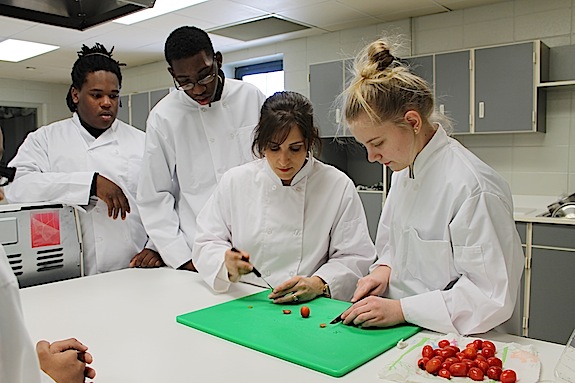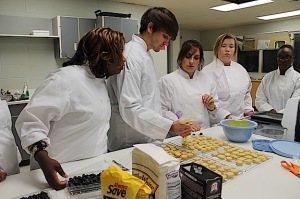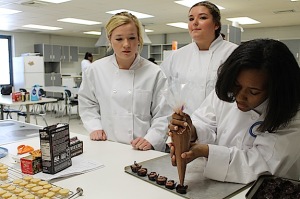Culinary Arts program offering new flavor to educational palate

“This was not where I thought I was going,” said Andi Turberville, director of the Culinary Arts curriculum at Demopolis High School.
But she’s very happy where she ended up.
The Culinary Arts program is in its first year. Previously instruction in foods and preparation had been folded into Family and Consumer Education, Turberville said.
Students entering the Culinary Arts program begin with a year-long introductory course in Hospitality and Tourism.
“Hospitality,” said Turberville, “is making somebody feel good.” She tries to stress to the classes that “you have to find delight in cooking for other people,” not just for yourself.

She has two classes of 20 students each enrolled in her Culinary Arts I class this year and next year will offer Culinary Arts II.
Classes this year are limited to one period – 48 minutes – which doesn’t always give students enough time to see a project through, she said. Beginning next fall Turberville hopes to expand each class to two hours and hold it for one semester.
The young men and women in the classes get practical experience as well. Beginning last September the students have taken on several catering jobs in Demopolis. They plan the menus, determine the ingredients, prepare and transport the food and then serve and clean up.
So far, said Turberville, they have gotten rave reviews.
“I like to take them out into the community,” she said. Many of her students have never been exposed to more formal entertaining. “The kids get so much more out of it.”
She charges customers the cost of the ingredients plus a percentage to cover the expenses in preparing and transporting the food.
The classes have a lot of input when it comes to determining the menu, but Turberville said that most everything prepared has an objective to it to go along with what is being covered in the classroom.
The kids in her class discover that what they learn in math and science are needed in food preparation as well as they adapt recipes to meet the needs of their clients.
By next fall the new Culinary Arts classroom renovation will be completed, thanks to a $62,000 grant. The current kitchen will be completely gutted, and all new cabinets and appliances will be installed to commercial grade equipment. Classroom and kitchens will be in the same space, freeing Turberville’s current classroom for the expansion of Health Sciences.

Turberville said she was in from the beginning on the design of the space and relied heavily on the DHS lunchroom workers to give their experienced input on what the kitchen would need.
Her students learn very quickly to use proper hygiene in the kitchen. They put on their chef’s coats and wash their hands as soon as they walk into the lab.
Turberville uses the guidelines set forth in ServSafe. This year five or six of her students will sit for the exam to be ServSafe certified. When they pass the students will be eligible automatically for an upgrade in pay.
Turberville is in the process now of being certified to proctor the ServSafe exam.
Several of her students already have expressed an interest in continuing their students in food preparation and restaurant management when they leave DHS. She is working with Shelton State Community College now to offer dual enrollment in two on-line courses.
Turberville didn’t start out to teach culinary arts. She earned her degree in elementary education from UWA in 2002 and taught kindergarten for a year and sixth grade math for eight years.
Cooking wasn’t a big focus as she grew up. It wasn’t until she had children of her own that Turberville discovered she enjoyed baking and was good at it.
When the position at DHS came open, she prepared for it and now is in her third year.
In her course the students also have to develop a business plan, not necessarily for a restaurant. In one exercise she had them work on preparing a plan for a business that is not in Demopolis, and the creative ideas that came back were delightful.
Like all the Career Tech programs, Culinary Arts has a five-member advisory committee of local professionals in the field.
Turberville said she hopes to work with Connie Davis, who directs the co-op program at DHS, to place students in local restaurants and hotels to learn more about the hospitality field.
She hopes, too, to combine her love for baking by expanding the Culinary Arts curriculum to include a pastry course.
This story is part of a series highlighting the career tech programs at Demopolis High School. The series will appear on Sundays throughout February in honor of Career Tech Month.
